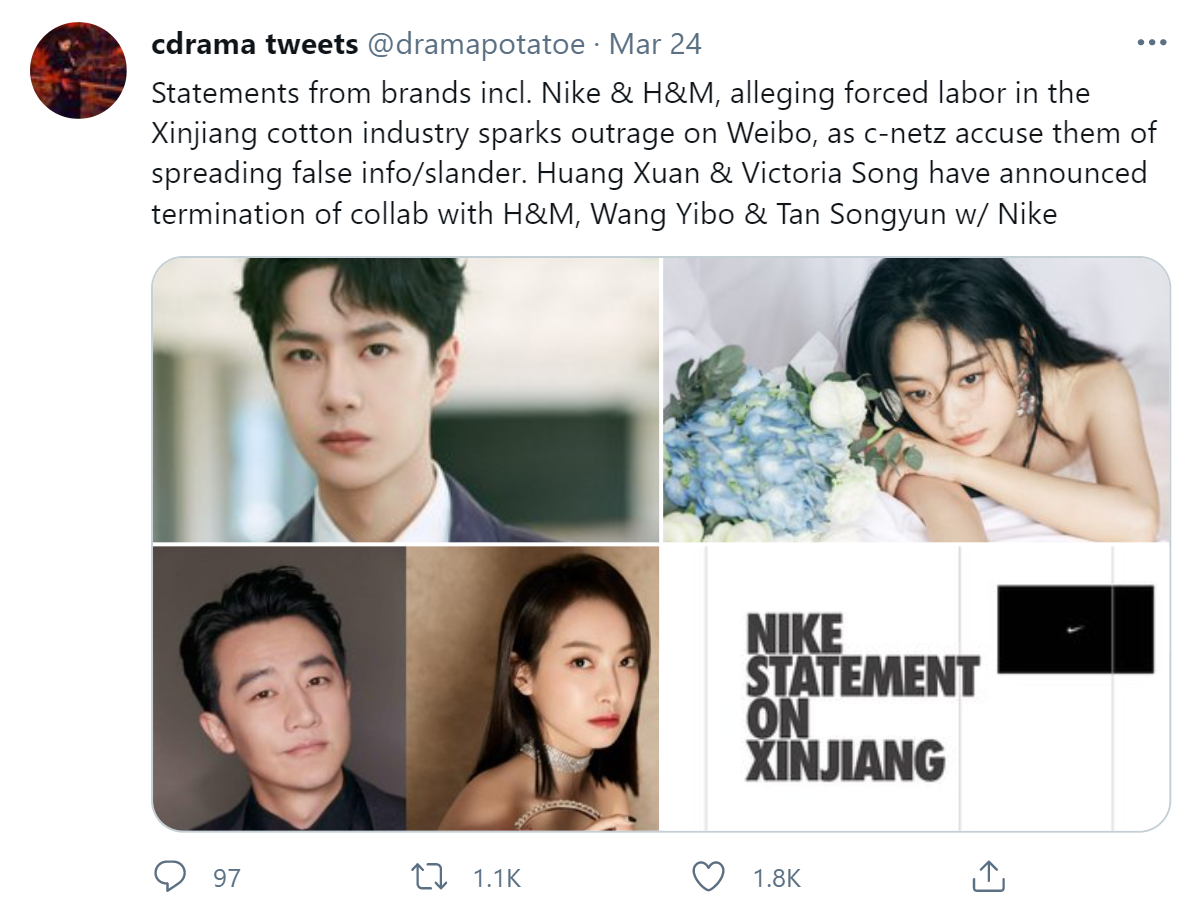H&M: Cotton the Act
Twitter account covering the Chinese entertainment industry announced a list of celebrities that had terminated their contracts with brands that are boycotting Xinjiang cotton. (Twitter, @dramapotatoe)
Two weeks ago, a Twitter account covering the Chinese entertainment industry posted this tweet: “Statements from brands incl. Nike & H&M, alleging forced labor in the Xinjiang cotton industry sparks outrage on Weibo, as C-Netz accuse them of spreading false info/slander.” The tweet was followed by a laundry list of celebrities who had terminated their contracts with Western brands boycotting Xinjiang cotton. Reactions to the tweet were chaotic: some announced their continued support for H&M while others praised the celebrities’ actions and insisted that Xinjiang cotton is harvested by machines.
Although H&M began its boycott of Xinjiang cotton last September, Chinese media outrage only began recently. Following Western sanctions on Chinese officials for human rights abuses in Xinjiang in late March, the Chinese Communist Youth League made a viral Weibo post criticizing H&M for “spreading rumors” about forced labor.
The backlash snowballed from there. Chinese platforms including ride-hailing app Didi-Chuxing, e-commerce giant Alibaba, shopping app Meituan, and navigation tool Baidu maps all removed H&M from their search results. Many other brands, including Nike, Adidas, Burberry, Uniqlo, and Lacoste, have followed H&M’s lead and also released statements boycotting Xinjiang cotton. Chinese TV networks began to blur the logos of these brands on air, delaying the release of much-anticipated episodes of pop idol competition shows. Top Chinese celebrities—including a Uyghur actress—have terminated their contracts with these brands.
Employing nationalistic narratives, Chinese officials tied the Xinjiang cotton boycott to the century of humiliation, the period from 1840-1940 when foreign powers subjugated China through unequal treaties and imperialistic wars. The Chinese government pushes the “century of humiliation” as a narrative to rally its citizens against undesirable foreign activities. Xinjiang government spokesman Xu Guixiang declared, “China is no longer the China of 1840, and the era when Chinese people suffered from great power hegemony and bullying will never return again.”
Curiosity Kills the C-Netizens
Previously, Chinese media has censored mentions of human rights violations in Xinjiang. They banned Weibo users for using phrases like “Xinjiang/Uyghur/large scale/systematic + torture/ill-treatment/sexual assault/sexual violence” and blocked Clubhouse, a software that Chinese netizens used to discuss the Xinjiang concentration camps and other taboo political issues.
The nationalistic backlash against Western brands has an unintended consequence: Chinese netizens have grown curious about the Xinjiang situation. One netizen wrote on Weibo, “I’m a bit confused. Could someone explain to me what happened? How are H&M and Nike discriminating against Xinjiang?”
Nonetheless, the overwhelming majority of Chinese users have expressed their support for Xinjiang cotton, partially due to the government’s use of celebrity endorsements—a common tactic used to smooth over contentious political issues. In 2019, Mainland celebrities publicized their support for the Hong Kong police. The consequence of celebrities going against the government is severe. For instance, when TV anchor Bi Fujian was caught on camera insulting Chairman Mao for making China suffer, all national news organizations reprinted an official reprimand and CCTV suspended his program for full days.
Boycotting Nike: Why China Can’t Just Do It
The H&M store in China’s Suzhou Industry Park. China is H&M’s fourth-largest market. (Source: Wikimedia)
Though state retaliation against Western brands has been vigorous, Chinese consumer response is more complicated. As expected, many Chinese consumers have turned to nationalistic buying, causing prices of some domestic sports shoe companies to surge more than 30 times the original retail price.
But the boycott of sportswear companies like Nike and Adidas is unlikely to last. Their products are still on China’s largest e-commerce platforms, and Nike’s newest drop of a women’s shoe sold out immediately. Additionally, China’s national soccer team has maintained its 10-year contract with Nike.
Why the contrast in Chinese market reaction toward Nike versus H&M? Dr. Shirley Ze Yu, Asia fellow at Harvard Kennedy School’s Ash Center, points to the difference in available substitutes for these brands. While Chinese consumers have a litany of fast-fashion brands to choose between, top-level athletes cannot easily replace Nike gear—especially with the Tokyo Olympics coming up in three months.
Meanwhile, H&M is attempting to tread the precarious line between keeping its fourth-largest market and upholding moral principles. The company released a statement on March 31 expressing its desire to “be a responsible buyer” while also “regaining the trust and confidence of our customers, colleagues, and business partners in China.”
To rectify its relationship with the Chinese market, H&M updated a map on its website that previously displayed controversial territories in the South China Sea as separate from China. However, this action has sparked a subsequent boycott in Vietnam, which also claims ownership of these islands. The chain of backlash towards H&M demonstrates that whichever course of action the company takes in its Asia market, it risks dissatisfying one or more stakeholders.


